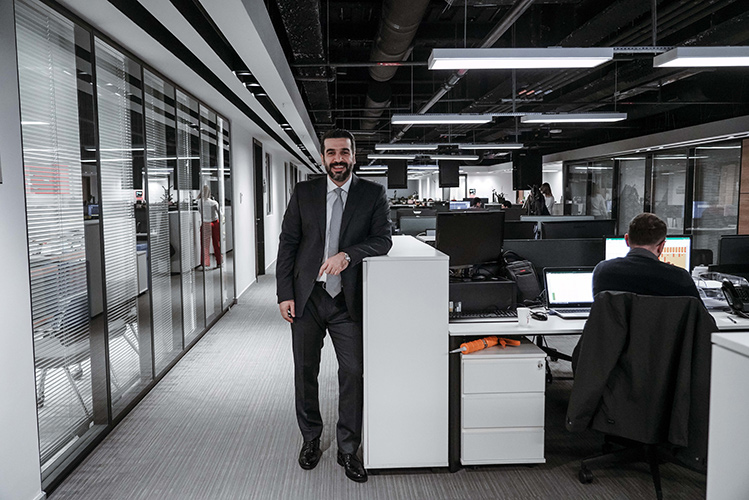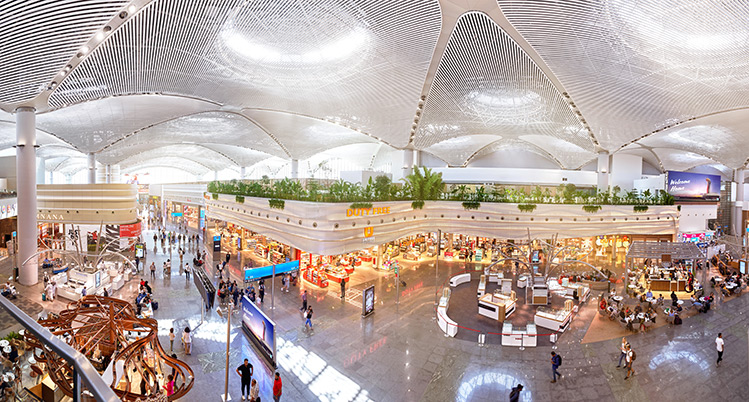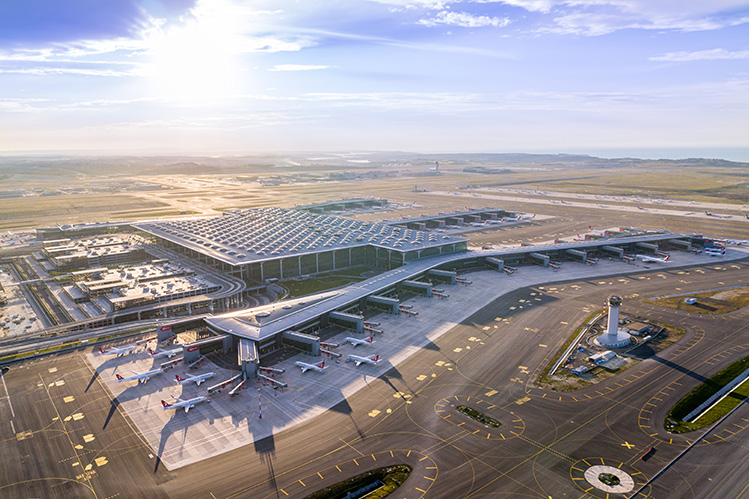An interview with Ersin Inankul, Chief Digital and Commercial Officer, iGA Istanbul Airport. By Ross Falconer
It is 18 months since the “Great Move” to the new Istanbul Airport. During that time, it has welcomed 70 million passengers and is now connected with over 300 destinations.
In line with digital transformation trends, the airport is committed to designing an end-to-end fully digital passenger experience that will take the digital customer journey to the next level.
Leading these efforts is Ersin Inankul, who began in the new role of Chief Digital and Commercial Officer at Istanbul Airport in February 2020.

Ersin Inankul, Chief Digital and Commercial Officer, iGA Istanbul Airport: “We continue our work at Istanbul Airport with the aim of transforming the time spent at the airport into a unique travel experience. Our goal is for our passengers to experience a beautiful and memorable journey by focusing on art and culture, away from travel stress.”
“Following the start of the new role, I have focused on merging commercial needs with IT capabilities,” he begins. “Currently, my focus is on developing a new digital strategy for commercial activities at Istanbul Airport to gain a deep and detailed view of our customer behaviour across all channels. I am developing a unique open commercial platform for technology-enabled collaboration with all related parties to enhance the services they offer and improve our passenger experience.”
The main projects prioritised within this scope include an e-commerce platform, digital wallet, digital passenger journey during the COVID-19 pandemic, contactless transactions, reward programme, digital marketing, and digital advertising platform.
Inankul’s previous experience includes being CIO at Istanbul Airport, as well as roles at TAV Information Technologies and TAV Construction. “Previously, I have successfully led multi-million-dollar telecom and airport projects in Turkey, Georgia, Tunisia, and the Middle East,” he explains. “This diversified pathway has allowed me to develop a multidisciplinary background, and an ability to adapt to and benefit from a variety of challenges. Currently, Istanbul Airport has more passenger capacity than the previous 12 airports I have worked with combined, and I have successfully managed to build the IT infrastructure and meet the technological needs of this airport thanks to my former experiences.”
A digital state of mind
Inankul emphasises that, in today’s world, a digital state of mind is required in all business decisions. Therefore, combining both responsibilities – Digital and Commercial – in one role helps to eliminate organisational bureaucracy and accelerate the digital transformation pace smoothly.
“Considering digital innovations, we plan to generalise our biometric applications,” says Inankul. “In particular, Istanbul Airport’s passenger processing systems will be reinforced with biometric solutions that incorporate facial recognition technology.”
Smart cameras will retrieve passengers’ biometric data from check-in desks and self-service kiosks, processing the data for use at various control points, such as security, border control, lounges, retail stores and boarding gates.
Once unique identification information is formed, comprising a combination of biometric data, flight details and passport or identity card, passengers will not be required to present any documents while travelling through the airport. This, Inankul explains, will reduce the time travellers spend at control points and increase their interest in commercial spaces.
On the commercial side, Istanbul Airport is establishing its own digital marketplace – istbuy.com – which will utilise Augmented Reality and Artificial Intelligence. “Thanks to this platform, we will be able to showcase and sell all the products and services available in duty free before our passengers arrive at the airport,” says Inankul. “We will be delivering campaigns and special offers customised according to our passengers’ behaviours in commercial stores, using different technologies, including notifications via beacons and instant offers with Augmented Reality.”
The airport’s ‘Digital Passenger Journey’ will be integrated with the Istanbul Airport app, with the aim of providing an environment in which travellers can plan their time at the airport in advance, minimising stress and focusing on moments of enjoyment.
ACI EUROPE Best Airport for Digital Transformation
The successful focus on digital innovation was recognised at the recent 16th ACI EUROPE Awards, at which Istanbul Airport won the Digital Transformation Award. This award, which is an initiative of ACI EUROPE in association with the SESAR Joint Undertaking, recognises airports that have embraced digitalisation, as well as innovative technologies and procedures, to enhance their operations.
Kadri Samsunlu, Chief Executive Officer, iGA Airport Operation: “Digital transformation is critical in many aspects, from operational performance to strategic advantages. Through taking advantage of different fields of technology, combined with the vision of SESAR (Single European Sky ATM Research), at Istanbul Airport we offer our passengers a unique digital journey experience thanks to the smart solutions we provide, as well as advanced technologies and different practices of digitalisation. With this process, we are achieving an even better operational capability and are able to reduce the airport costs as well as create an enhanced passenger experience that is digitally-aware. In conclusion, I would like to emphasise that our airport provides valuable insights into how digital transformation can be carried out in the best way possible. Winning the ‘Best European Airport Award for Digital Transformation’ is a great honour and a motivating affirmation of our ongoing efforts at iGA Istanbul Airport.”
Inankul adds: “It is a great honour for me and my team to be deemed worthy of this award in such a hard category and among Europe’s most important airports, despite being a new airport. We believe in the power of digital transformation to serve as the airport of the future. With the advantages that digital transformation offers, such new practices will provide us with the critical data for the purposes of managing the workload and to shape the trade at the airport.”
“We attach importance to local and international diversity”

Istanbul Airport’s 46,000sqm retail area offers passengers the opportunity to shop from many major international brands such as Louis Vuitton, Dior, Gucci, Saint Laurent, Hugo Boss, and Fendi, as well as local concepts that create a sense of place.
Istanbul Airport’s 46,000sqm retail area offers passengers the opportunity to shop from many major international brands such as Louis Vuitton, Dior, Gucci, Saint Laurent, Hugo Boss, and Fendi, as well as local concepts that create a sense of place.
The Bosphorus Zone in the duty free shopping area, with architecture inspired by the Bosphorus in Istanbul, brings together iconic global brands and local Turkish brands. “We attach importance to local and international diversity in our airport,” Inankul emphasises. “In addition to luxury stores, we created a concept consisting of stores that sell Turkish delight, baklava, coffee, and local souvenirs.”
So, while the jewellery and accessories range includes major brands BVLGARI, Swarovski and Pandora, there are also ‘ATÜ Bazaar’ stores offering a comprehensive selection of local products such as Turkish delight and Turkish coffee.
“We continue to work with new brands that want to take a place in our airport,” Inankul explains. “Examples of brands that already have a store at the airport are Pierre Cardin/Cacharel, LCW, D&R, Zen Diamond, Saat & Saat, Hermes, Prada, Yargıcı, Longchamp, Michael Kors, Mavi, Vakko, Desa, İpekyol, Nike, Kığılı, and Ray-Ban.”
In January 2020, ATÜ Duty Free, a partnership between TAV Airports and Unifree Duty Free/Gebr. Heinemann, opened a new 800sqm multi-brand concept, the Luxury Square, at Istanbul Airport.
“The traditionally strong sub-category of handbags leads sales, but, perhaps surprisingly, footwear and streetwear are the other segments performing above expectations,” Inankul explains. “We have tried to create a perfect mix, with some classic brands that appeal strongly to millennials today, such as Burberry, Givenchy or Chloé, and hot brands such as Off-White or Palm Angels.”
Importantly, the opportunity to purchase across categories in the Luxury Square is strong. “You don’t feel like you’re in a zone just for fashion and accessories. Cross-product sales and categories such as sports shoes, bags, and sunglasses, which are among the most demanded categories, are all together. It was designed as an area that is easy to shop and access.”
In addition to the retail offer, there are 67 food & beverage units spread across an area of more than 33,000sqm. Two new outlets opened in July 2020: Subway’s first outlet at Istanbul Airport, and local brand Cups & Clouds – a stylish coffee shop with an apron scene on Pier B.
“We try to enrich the menu we can offer to passengers,” says Inankul. “So far, we have restaurants with Turkish, Japanese, and Italian cuisines (Tadında Anadolu, Yo Sushi, Enzo) and also with healthy and vegan options (Gram). We plan to diversify with other cuisine preferences. Our fast food line consists of international brands like Burger King, Sbarro, Popeyes, and Subway.”
In terms of coffee shop concepts, international brands like Starbucks and Gloria Jeans are complemented by local outlets such as Cups and Clouds. Turkish-based international brand Simit Sarayı, meanwhile, has an important bakery concept at Istanbul Airport. “Our main target on the F&B side is to fill the brand basket not only with familiar and international names, but also local and quality ones,” Inankul adds.

Integrating digital experience with physical retail experience
From the 90s to the present day, shopping habits have evolved from traditional resources to online channels. “The combination of multichannel marketing and online shopping with physical stores offers an ideal shopping experience. The online experience lays the groundwork for physical purchasing behaviour,” says Inankul.
Indeed, the airport is following the trend of integrating digital experience with physical retail experience in the development of the ‘istbuy.com’ digital marketplace platform.
“We will take the retail experience to the next level with a service where passengers can shop with a higher level of awareness and consciousness, inform themselves on what awaits them at the airport before they arrive here, especially when the time they will spend at the airport is limited, and also get access to advantageous offers and suggestions at any time,” Inankul enthuses.
The digital marketplace platform will allow all commercial stores to generate campaigns both individually and interactively. This campaign module will be supported by Augmented Reality (AR), so travellers will be able to display campaigns and special products available in all stores on their mobile devices, while receiving indoor navigation service through their smartphone cameras.
“Under this AR-supported campaign system, an AI-supported recommendation engine will be employed,” Inankul comments. “The system will generate passenger-specific recommendations, and will offer its suggestions via the marketplace, AR, Istanbul Airport app, and various digital screens. In addition, we will offer our passengers the opportunity to earn and spend points, as well as contactless payment, thanks to the digital wallet available on the system, based on their spending habits and behaviour patterns at our airport.”
In line with digital transformation trends, it is evident that AR applications, mobile contactless payment, and technologies that support the social distancing introduced as a result of COVID-19, will remain at the forefront.
Inankul explains that Istanbul Airport is continuing its efforts to design an end-to-end fully digital passenger experience, taking the customer journey to the next level. In this context, it is making use of chatbot, voice assistant, mobile payment, biometric, and AR technologies. “By integrating all these technology solutions with our big data management platforms, we will recognise the passenger even before travel, mitigate their travel concerns, and start to offer solutions suited to their habits and needs even before they arrive at the airport, while allowing for a much more enjoyable and comfortable airport experience.”
Ersin Inankul curriculum vitae
Ersin Inankul began in the new role of Chief Digital and Commercial Officer at Istanbul Airport in February 2020, having been CIO at the airport since 2015.
Previously, Inankul successfully led multi-million-dollar telecom and airport projects in Turkey, Georgia, Tunisia, and the Middle East, including roles at TAV Information Technologies and TAV Construction.







